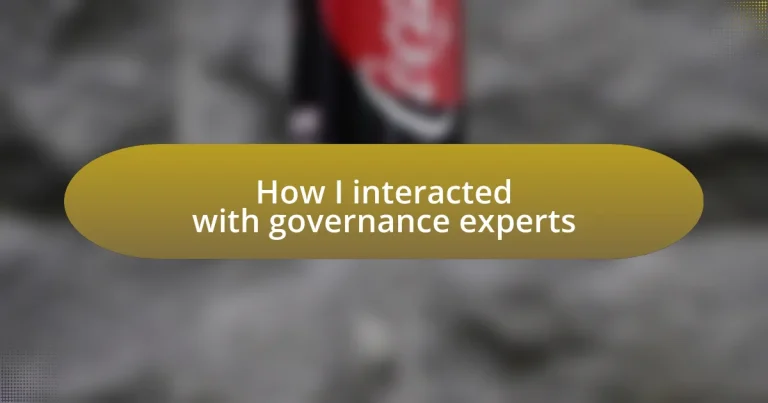Key takeaways:
- Governance experts possess a unique blend of skills and experiences that enhance decision-making and policy development.
- Building relationships with governance experts is vital; consistency and thoughtful follow-ups strengthen these connections.
- Effective engagement involves preparation, active listening, and creating a collaborative atmosphere for deeper discussions.
- Learning from experts often challenges assumptions and highlights the importance of inclusivity and citizen engagement in governance.
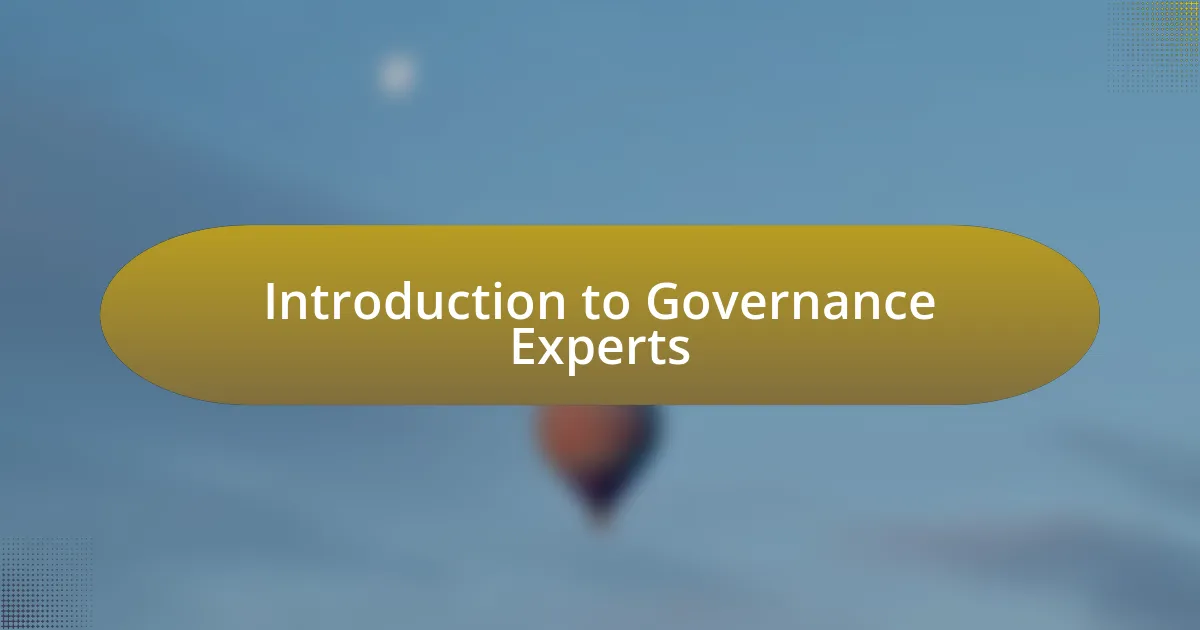
Introduction to Governance Experts
When I first learned about governance experts, I was intrigued by the wide range of skills and knowledge they possess. These professionals navigate complex political landscapes, providing insights that can drive effective decision-making and policy development. But what exactly sets them apart in a world filled with rapidly changing regulations and diverse interests?
I remember attending a seminar where a governance expert shared her journey from grassroots activism to becoming a key advisor in governmental reform. It was inspiring to see how her experiences shaped her deep understanding of governance dynamics. Hearing her story made me wonder, how many valuable lessons go unnoticed when we think of governance as just a bureaucratic process?
In my interactions with these experts, I often found myself in conversations that blurred the lines between theory and practice. They have a unique ability to translate complex legal and ethical considerations into relatable concepts. Do you ever consider how the effectiveness of governance relies heavily on the insights and experiences of those who study it? The depth of their knowledge can truly illuminate paths to progress, and this is something I’ve come to appreciate more with each discussion.
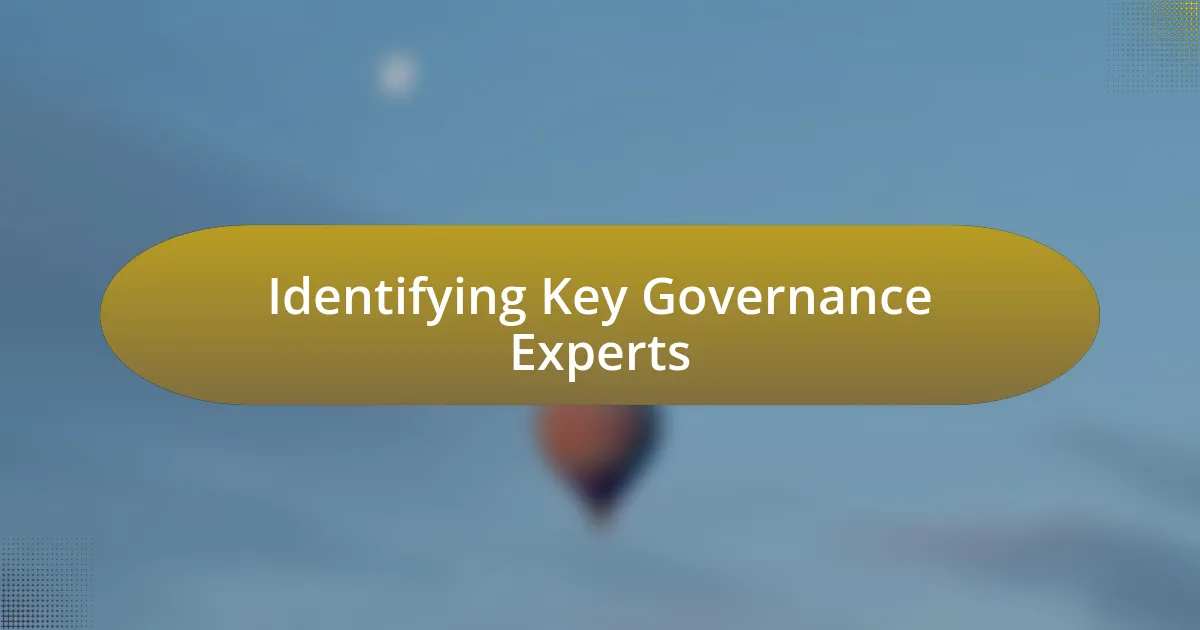
Identifying Key Governance Experts
Identifying key governance experts can seem daunting at first, but I’ve found it to be a rewarding endeavor. Often, I start this journey by looking for individuals with a proven track record in both academia and practice. Personal referrals from trusted colleagues also help, as it’s amazing how word-of-mouth can lead to discovering individuals who may not be in the spotlight yet have invaluable insights to share.
Here are some attributes that have guided my search for governance experts:
- Relevant Experience: Individuals who have worked in various governance roles or projects.
- Academic Credentials: Those with advanced degrees in public administration, law, or related fields.
- Publications: Experts who have contributed to reputable journals or written extensively on governance issues.
- Networking: Attending conferences and seminars can be great for connecting face-to-face.
- Innovative Thinking: Look for individuals who challenge the status quo and suggest fresh approaches to governance.
I recall attending a workshop where a lesser-known expert captivated the audience. Her case studies were so relevant that they highlighted overlooked governance issues in real-time. That experience reinforced how sometimes the best insights come from those not traditionally labeled as ‘go-to’ experts.
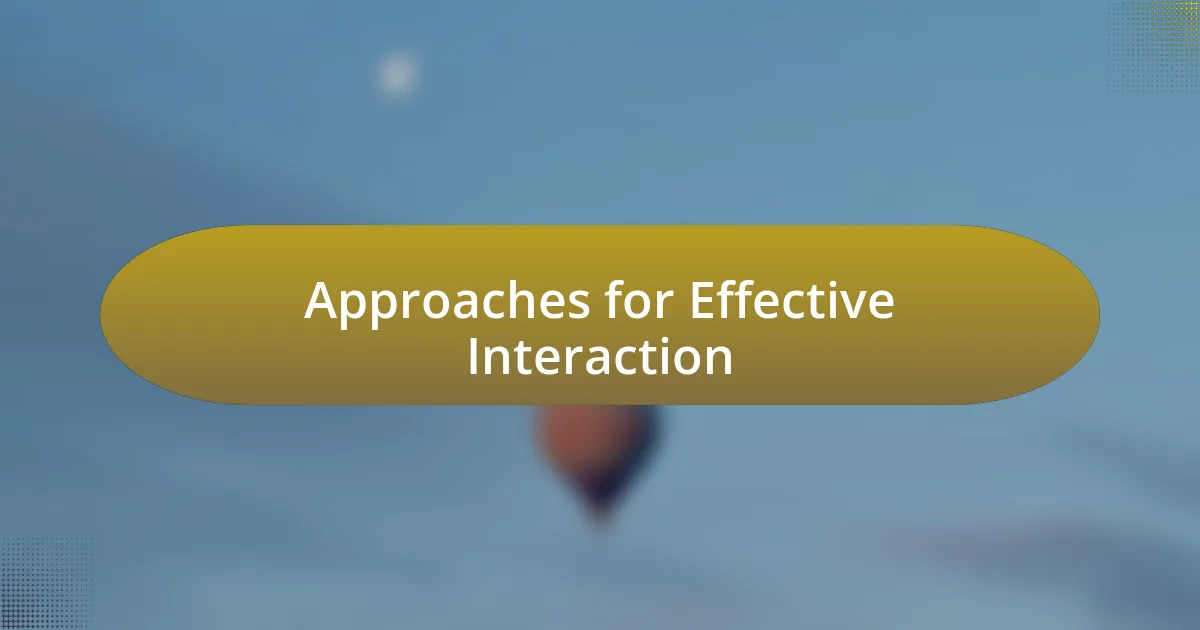
Approaches for Effective Interaction
Effective interaction with governance experts requires a thoughtful approach. One strategy I find beneficial is to come prepared with specific questions. I recall a conversation with a governance specialist where I laid out my concerns regarding community engagement in policy-making. This focus led to a rich discussion that not only clarified my doubts but also sparked new ideas for projects I was working on.
Another approach is to actively listen. I often practice reflective listening, where I summarize what the expert has shared before I respond. I remember a session where I listened to an environmental governance expert share his insights on sustainable policies. My ability to paraphrase his points not only showed my engagement but also deepened the discussion, enabling him to expand on areas I found particularly compelling.
Finally, fostering a collaborative atmosphere can make a significant difference. I’ve found that setting the tone for open dialogue encourages experts to share their thoughts more freely. In a recent roundtable, our relaxed environment allowed for brainstorming without the pressure of formalities. Participants shared their unique perspectives, leading to innovative solutions for governance challenges we faced.
| Approach | Description |
|---|---|
| Preparation | Come with specific questions to guide your interaction. |
| Active Listening | Reflect on what the expert shares to deepen understanding. |
| Collaboration | Create an open, relaxed environment to foster dialogue. |
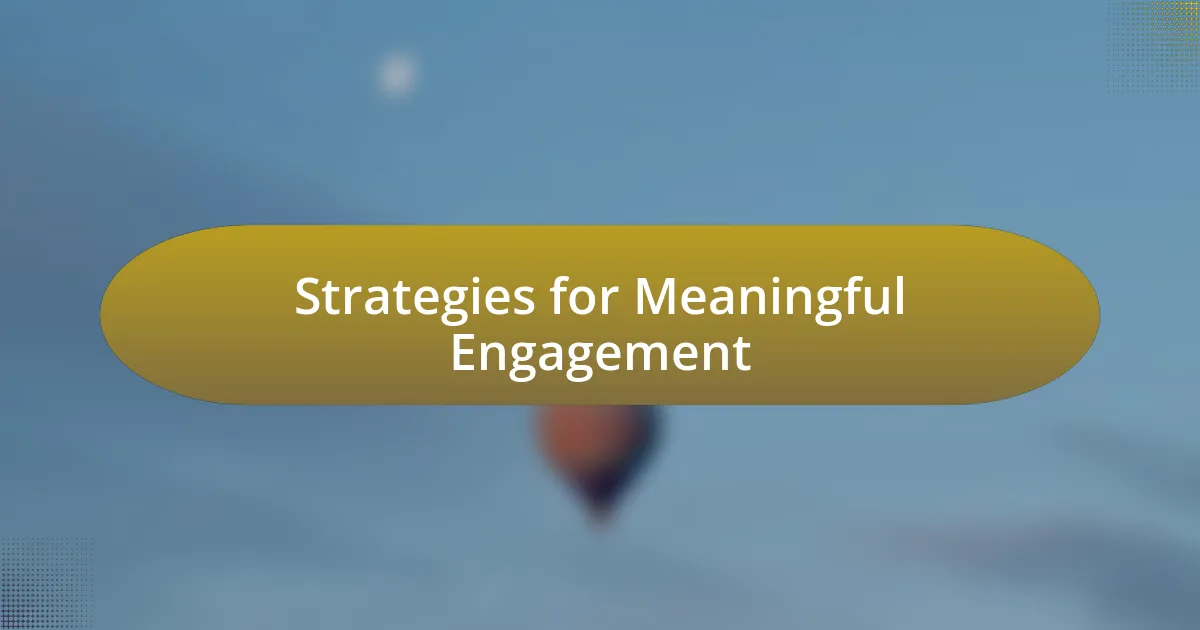
Strategies for Meaningful Engagement
One effective strategy for meaningful engagement is to establish common ground with governance experts. I remember a time when I connected with a public policy analyst by sharing a mutual interest in community health initiatives. This shared passion not only made the conversation more enjoyable but also encouraged a deeper exploration of policy implications on local health outcomes. Have you ever noticed how discussing a shared interest feels like opening a door to more profound insights?
Another approach is to embrace vulnerability in conversations. When I recently spoke with a governance expert about a failed project of mine, I openly discussed the lessons learned. I sensed a shift in our dialogue; my authenticity invited them to share their own challenges. This back-and-forth fostered an atmosphere of trust, and together we identified practical strategies for future initiatives.
Lastly, following up after your interaction can amplify the impact of the conversation. I once reached out to an expert with a thank-you note that included some of the ideas we discussed. This simple gesture not only solidified my commitment to our shared goals but also opened the door for continued dialogue. I’ve learned that maintaining connections helps turn a one-time interaction into a collaborative journey. How do you nurture relationships built during expert interactions?
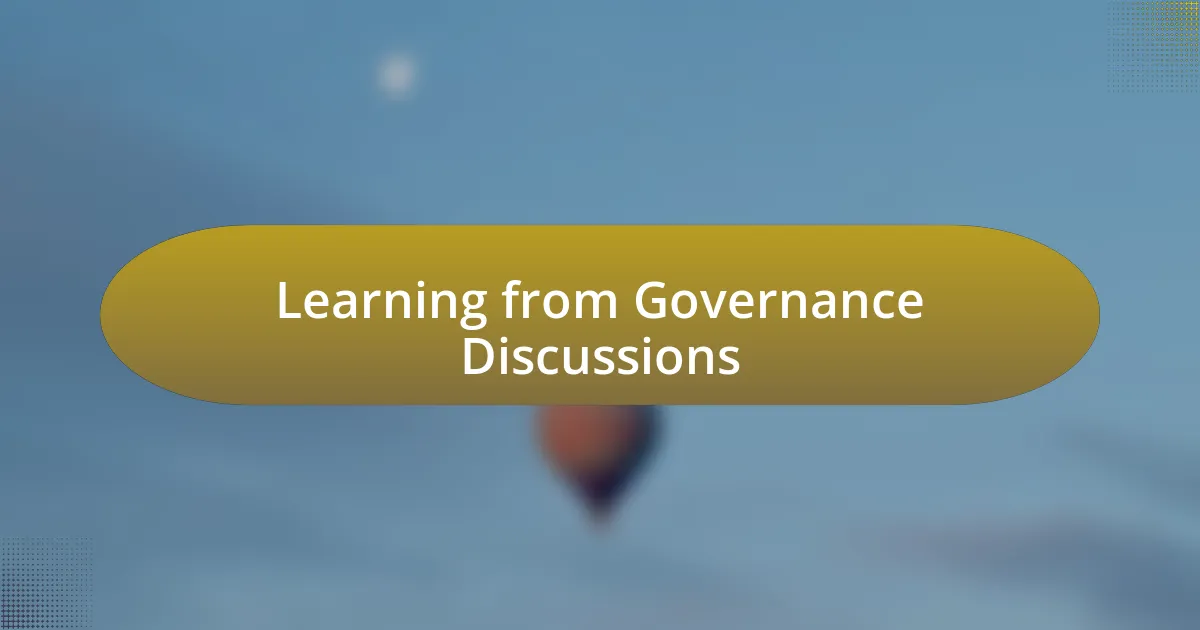
Learning from Governance Discussions
Learning from governance discussions has been an eye-opening experience for me. I vividly recall a roundtable I attended where seasoned experts shared their perspectives on policy reforms. Their stories not only enriched my understanding but also sparked a fascinating conversation about the emotional toll of decision-making in governance. Have you ever felt that moment when a discussion shifts from theoretical to deeply personal?
Engaging with governance experts often reveals unexpected insights that challenge my assumptions. During one conversation, I encountered an expert who emphasized the importance of citizen engagement in policymaking. As I reflected on my past views, I realized how crucial it is to include diverse voices in discussions. It made me think: how can we genuinely champion inclusivity in the governance process?
I’ve also learned the value of asking thoughtful questions during these discussions. I remember asking one expert about the role of technology in enhancing government transparency. Their response not only deepened my comprehension but inspired me to explore new avenues for civic tech initiatives. How often do we seize the opportunity to turn questions into avenues for collaboration?
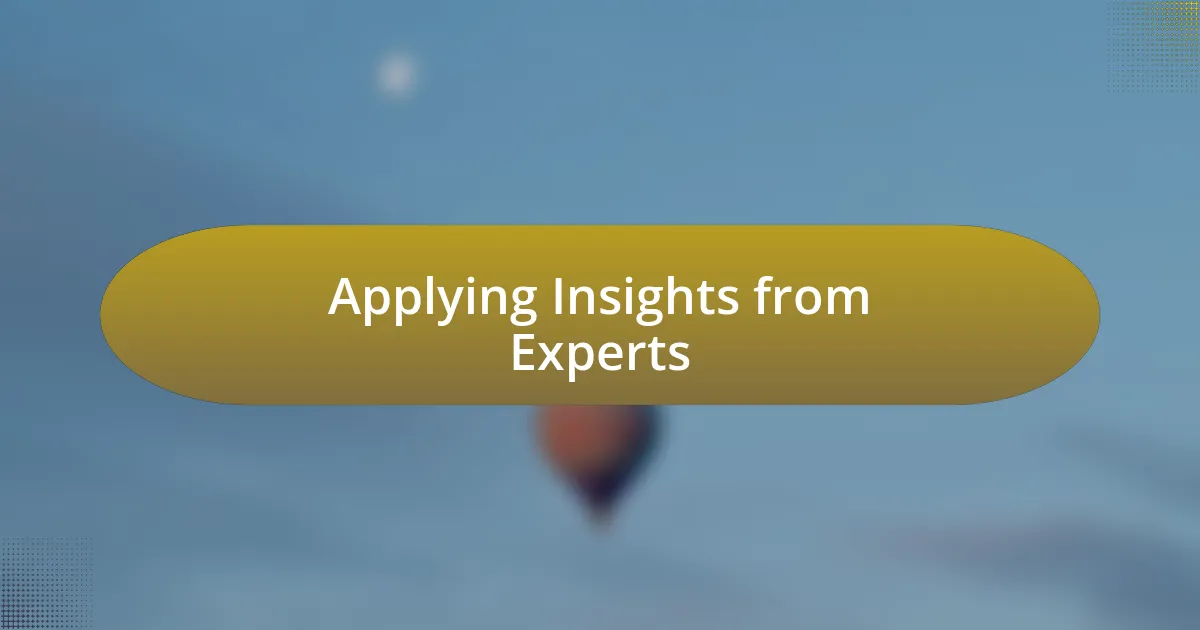
Applying Insights from Experts
Navigating the insights offered by governance experts transforms my approach to problem-solving. I remember an instance where an expert shared how small changes in policy can ripple through communities. Hearing this made me reflect on a local initiative I was involved in, where minor adjustments improved citizen engagement significantly. Have you ever realized the power of subtle shifts in your own work?
One powerful lesson I took away was the importance of active listening. In a recent session, an expert shared a story about a community project that thrived because leaders genuinely listened to their constituents. It struck a chord with me; I started to notice how often I may have overlooked voices in my own projects. How can we really foster meaningful dialogue if we don’t commit to hearing every perspective?
Embracing these insights has encouraged me to adopt a more collaborative mindset. I vividly recall a workshop where I initiated a group discussion to implement expert suggestions on enhancing transparency. The enthusiasm that followed was palpable—everyone wanted to pitch in. It made me wonder, how much more can we achieve when we harness collective expertise? Each interaction serves as a reminder that applying the knowledge from these discussions not only enriches our work but also connects us to the communities we aim to serve.
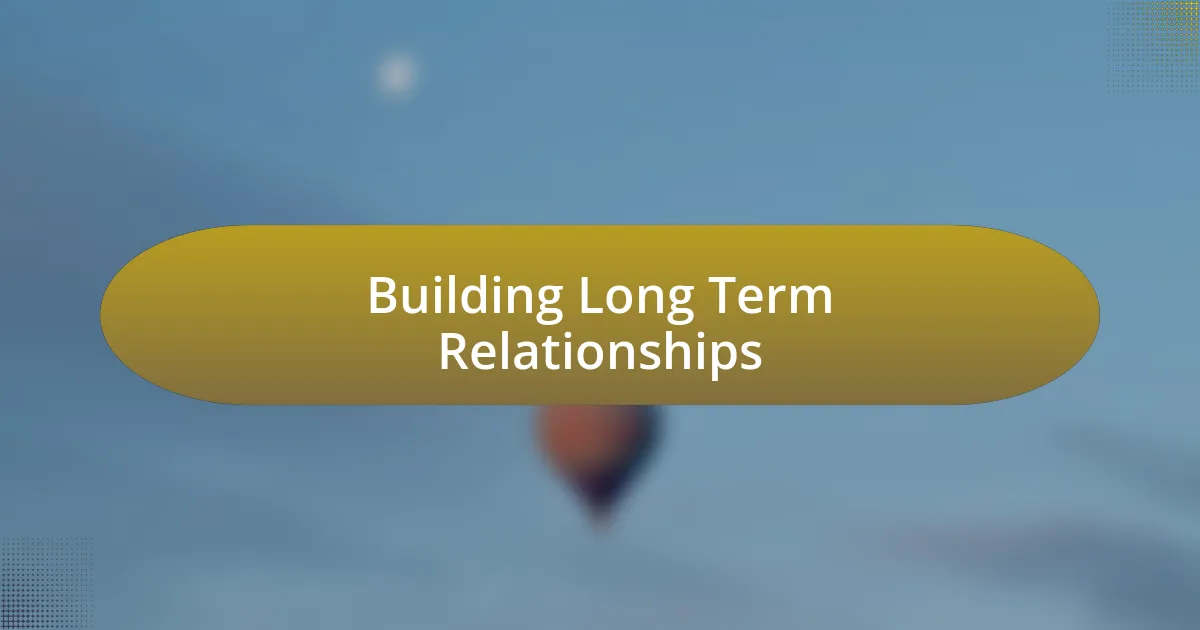
Building Long Term Relationships
Building long-term relationships with governance experts requires a genuine investment in connection. I recall my first encounter with a seasoned expert at a conference; we struck up a conversation that lasted well beyond the event. In that moment, I realized that taking the time to build rapport could open doors not only to insights but also to collaborative opportunities. What happens when you prioritize relationships over transactions?
Trust is the cornerstone of any enduring relationship. I remember following up with an expert who had provided invaluable feedback on a project I was working on. Instead of just reaching out when I needed something, I made it a habit to share updates and seek their thoughts on future initiatives. This gesture cultivated a sense of partnership rather than a one-sided struggle. Have you noticed how simple acts of recognition can strengthen your alliances?
Moreover, I’ve found that consistency makes a difference. Attending regular meetings, sending thoughtful updates, or even sharing relevant articles can keep the connection alive. In my experience, I once sent a handwritten note of appreciation to an expert who had advised me through a particularly challenging phase. The heartfelt response I received not only reinforced our bond but also reminded me that relationships thrive on mutual respect and acknowledgment. Isn’t it fascinating how small gestures can lead to lasting ties?

